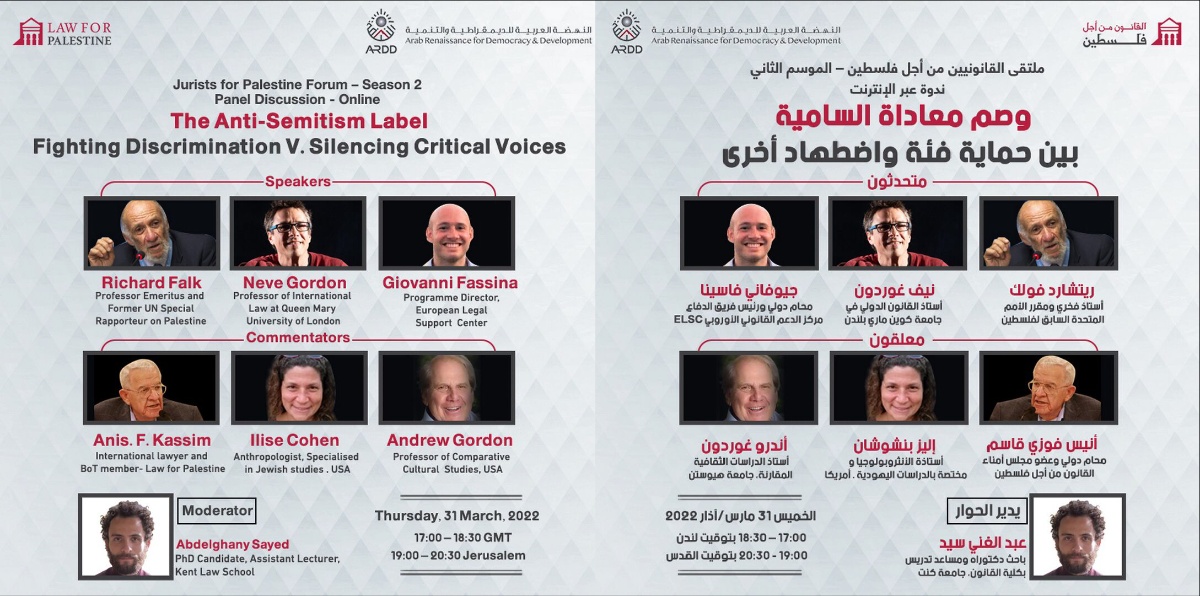Jurists for Palestine Forum, one of Law for Palestine’s projects and the widest international network for legal professionals interested in the Question of Palestine, and in partnership with the Arab Renaissance for Democracy and Development (ARDD) as part of its Question of Palestine program, are pleased to announce a webinar on the Anti-Semitism Label: Between Fighting Discrimination and Silencing Critical Voices.
Main Information:
- Date: Thursday 31st March 2022.
- Time: 7:00-9:00 PM (Jerusalem Time), At 5:00-7:00 PM (GMT).
- Location: Online – Participants will be provided with a link prior to the webinar time.
- Language: The webinar will be conducted in English. Simultaneous translation into Arabic will be available.
- Registration is required: The webinar is open for the members of Jurists for Palestine Forum (You are not a member? Register here).
Background
The International Holocaust Remembrance Alliance (“IHRA”) has in 2016 adopted a non-binding working definition of anti-Semitism, setting an example of responsible conduct for other organizations and providing a tool to combat anti-Semitism. While some argue that ‘antisemitism’ is being weaponized to silence critical voices and that the definition has expanded to include any criticism of the policies of the State of Israel, others argue that such a clear legal definition is required to combat prevalent discrimination against Jewish people all over the globe.
On the ground, although the definition lacks criteria for appropriate legislation, it has ever since been incorporated into local law by some Western states and incorporated into internal regulations by many Western academic institutions. UN Special Rapporteur on freedom of religion encouraged the use of the definition in the areas of education and awareness-raising.
Against this backdrop, many lawyers, academics, and human rights defenders around the globe claim that they are exposed today to constant menace, their freedom of expression is jeopardized, and are effectively silenced with respect to matters that might entail criticism of policies carried out by the government of Israel. Some complain that they have been chased, labeled, and harassed on allegations of anti-Semitism.
Further, The International Criminal Court prosecutor’s decision to open investigation in Palestine described by the then Prime Minister of Israel as ‘undiluted anti-Semitism’. Movements like BDS, based entirely on international law (according to several court’s rulings, including ECtHR), have been considered as anti-Semitic and discriminatory.
In view of the need to protect a group but without suppress another, and the dangers on freedom of expression in this regard, this webinar is intended to address these issues:
- How to balance between the need to combat anti-Semitism but protect the freedom of expression? What is the UN and other international actors role in this regard?
- Does the IHRA definition of antisemitism threaten the work of lawyers, academics, human rights defenders, and journalists, among others? How?
- Does the current trend of adopting the definition to laws and policies affect the rule of law and democracy? And is the drawback only in the IHRA definition or is it further than that?
- What are the mechanisms to combat such repercussion? Can judicial systems be recruited to challenge these legislations on grounds of unconstitutionality? Can popular means of resistance be employed in this regard?
The Panel Guests:
In this special interactive debate, we bring together 6 leading experts, as follows:
Speakers:
- Richard Falk: International law and international relations scholar, Emeritus Professor at Princeton University, and Former UN Special Rapporteur on the situation of human rights in the occupied Palestinian territories between 2008-2014. In 2004, he was listed as the author or coauthor of 20 books and the editor or co-editor of another 20 volumes.
- Neve Gordon, Professor of International Law at Queen Mary University of London. He authored or coauthored several books on Israel’s Occupation, The Human Right to Dominate, and Human Shields. he helped found (and served as a board member) of the bi-lingual Jewish-Palestinian school Hagar. Gordon’s is currently the Vice President of the British Society for Middle East Studies.
- Giovanni Fassina: Programme Director of the European Legal Support Center ELSC. In 2017 he carried out a research project on the Israeli oil exploration in the Occupied Syrian Golan and worked for many years in the Occupied Palestinian Territory in the development sector.
Commentators:
- Anis. F. Kassim, International lawyer and Board of Trustees member at Law for Palestine organisation. Dr. Kassim served as a judge at the Administrative Tribunal of the Arab League, was editor-in-chief of the Palestine Yearbook of International Law from 1984 to 2000, and was a member of the Palestinian defense team in the case against the Israeli separation wall at the International Court of Justice (2004).
- Ilise Cohen, Scholar specialised in Jewish studies and Postcolonial Anthropology (USA). She is the co-founder of the Atlanta chapter of Jewish Voice for Peace. Cohen has led several delegations of North Americans to Palestine/Israel to meet with human rights defenders to address the Israeli violence. She wrote a chapter on ‘Intersections of Antisemitism, Racism, and Nationalism: A Sephardi/Mizrahi Perspective’ in “On Antisemitism: Solidarity and the Struggle for Justice”.
- Andrew J Gordon: Associate Professor of Comparative Cultural Studies, University of Houston. He has couple of books published and over forty articles in peer reviewed journals. His chief concerns as an academic and personally are in the areas of ethnic identity and conflict; and he is attracted to the alternative responses to the many questions relevant to the Palestine-Israeli conflict.
The discussion will be moderated by:
Abdelghany Sayed: Law for Palestine fellow, PhD Candidate and Assistant Lecturer at Kent Law School.
To participate in this discussion, you need to register for a membership with Jurists for Palestine Forum


